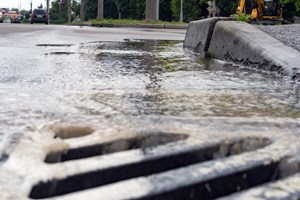San Francisco Civil Grand Jury calls for flood management improvement following climate-related sewer system failures
(UI) – Climate change is bringing higher seas and greater storms that threaten to inundate San Francisco with flooding, and the San Francisco Public Utilities Commission (SFPUC) has reported that the city's sewer system cannot handle the change, the San Francisco Civil Grand Jury reported.

A new jury report released findings that San Francisco lacks a comprehensive funding plan for climate change adaptation, that interdepartmental coordination is hampered by siloed agency planning, that the city pays for avoidable flooding costs, and debt policies impose limits on the city's ability to fund essential adaptation projects.
“All of this is aggravated by a lack of transparency about what is currently being done, and what will need to be done, to maintain resilience in the face of climate change,” the report said.
In 2021, ClimateSF, a partnership of the SFPUC and the Port, along with the Planning Department, the San Francisco Environment Department, and the Office of Resilience and Capital Planning, was created by the Mayor's Office to coordinate and oversee existing and future climate resilience projects. The partnership's charter includes the objectives of "coordinated planning and performance management," and "aligned communications and engagement."
The Jury's report evaluates the city's progress towards these objectives, with an emphasis on flood management.
The report's recommendations include:
- Reforming the process of decision making in the Climate Resilience Program;
- Providing more transparency in planning for climate adaptation in the city;
- Reassessing likely shortfalls in funding to respond to climate change;
- Improving interdepartmental coordination by the city to address expected flooding; and
- Stronger messaging by the city to notify the public about flood insurance options and to identify the areas of the city most likely to be affected.
"With at least 23,700 residents likely harmed by inland flooding, the city needs a more comprehensive and integrated plan to adapt to climate change," said Michael Carboy, Jury Foreperson. "How the city will pay for the adaptation and execute the projects should be made transparent to all residents."
Related News
From Archive

- Glenfarne Alaska LNG targets late-2026 construction start for 807-mile pipeline project
- U.S. water reuse boom to fuel $47 billion in infrastructure spending through 2035
- $2.3 billion approved to construct 236-mile Texas-to-Gulf gas pipeline
- Major water pipe break in Puerto Rico hits over 165,000 customers
- Potomac River Tunnel project enters construction phase beneath Washington, D.C.
- Pennsylvania American Water launches interactive map to identify, replace lead water service lines
- Trump's tariffs drive $33 million cost increase for Cincinnati sewer project
- Utah city launches historic $70 million tunnel project using box jacking under active rail line
- Tulsa residents warned after sewer lines damaged by boring work
- Fatal trench collapse halts sewer construction in Massachusetts; two workers hospitalized



Comments